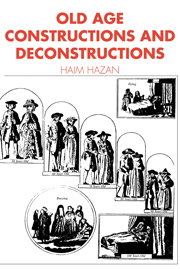Book contents
- Frontmatter
- Contents
- Acknowledgements
- Introduction: towards knowledge of old age
- PART I REPRESENTATIONS OF AGEING: LANGUAGES ABOUT OLD AGE
- 1 The social trap: the language of separation
- 2 The cultural trap: the language of images
- 3 The personal trap: the language of self-presentation
- 4 The theoretical trap: the missing language
- PART II PRESENTATIONS OF AGEING: LANGUAGES OF THE OLD
- Conclusions: the nature of knowledge about ageing
- Notes
- Bibliography
- Index
4 - The theoretical trap: the missing language
Published online by Cambridge University Press: 05 June 2012
- Frontmatter
- Contents
- Acknowledgements
- Introduction: towards knowledge of old age
- PART I REPRESENTATIONS OF AGEING: LANGUAGES ABOUT OLD AGE
- 1 The social trap: the language of separation
- 2 The cultural trap: the language of images
- 3 The personal trap: the language of self-presentation
- 4 The theoretical trap: the missing language
- PART II PRESENTATIONS OF AGEING: LANGUAGES OF THE OLD
- Conclusions: the nature of knowledge about ageing
- Notes
- Bibliography
- Index
Summary
The quest for the universal in research on ageing can be divided into four phases. The first, which might be termed the ‘functional approach’, consisted of the cross-cultural examination of the division of labour and the allocation of resources in society, and it revealed that the status of the aged was largely determined by their mastery of socially valued assets and functions. Pioneered by Simmons (1945), it was based on an extensive ethnographic survey of the role of the aged in seventy-one pre-industrial societies. This functional orientation was elaborated and extended by scholars such as Maxwell and Silverman (1970), who focused on the importance of information and knowledge as a social resource, and Glascock and Feinman (1981), who examined the asset value assigned to the elderly.
A more interactional view of the response of the elderly to their existential conditions, the ‘adaptive’ approach, took an uncompromising stand on the question of the accommodation between the elderly and society. A concept of ‘successful ageing’ involved the relation between personal adjustment to impending death and the imputed interests of the overall social system (Cumming and Henry 1961). Clark and Anderson's (1967) study of the nexus between personality configurations and cultural patterns in American society distinguished five adaptive modes on the part of the aged. Classifications of adaptive responses based on compatibility between cultural opportunities and personal traits were further developed by other scholars (Smith-Blau 1973; Fontana 1976).
- Type
- Chapter
- Information
- Old AgeConstructions and Deconstructions, pp. 39 - 50Publisher: Cambridge University PressPrint publication year: 1994



